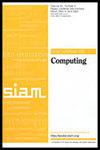Subexponential Parameterized Algorithms for Planar and Apex-Minor-Free Graphs via Low Treewidth Pattern Covering
IF 1.6
3区 计算机科学
Q3 COMPUTER SCIENCE, THEORY & METHODS
引用次数: 0
Abstract
SIAM Journal on Computing, Volume 51, Issue 6, Page 1866-1930, December 2022.Abstract. We prove the following theorem. Given a planar graph [math] and an integer [math], it is possible in polynomial time to randomly sample a subset [math] of vertices of [math] with the following properties: [math] induces a subgraph of [math] of treewidth [math], and for every connected subgraph [math] of [math] on at most [math] vertices, the probability that [math] covers the whole vertex set of [math] is at least [math], where [math] is the number of vertices of [math]. Together with standard dynamic programming techniques for graphs of bounded treewidth, this result gives a versatile technique for obtaining (randomized) subexponential-time parameterized algorithms for problems on planar graphs, usually with running time bound [math]. The technique can be applied to problems expressible as searching for a small, connected pattern with a prescribed property in a large host graph; examples of such problems include Directed [math]-Path, Weighted [math]-Path, Vertex Cover Local Search, and Subgraph Isomorphism, among others. Up to this point, it was open whether these problems could be solved in subexponential parameterized time on planar graphs, because they are not amenable to the classic technique of bidimensionality. Furthermore, all our results hold in fact on any class of graphs that exclude a fixed apex graph as a minor, in particular on graphs embeddable in any fixed surface.
基于低树宽模式覆盖的平面图和顶点无次图的亚指数参数化算法
SIAM计算杂志,第51卷,第6期,1866-1930页,2022年12月。摘要。我们证明下面的定理。给定一个平面图[math]和一个整数[math],可以在多项式时间内随机抽样[math]的一个顶点子集[math],具有以下属性:[math]引出一个树宽[math]的子图[math],并且对于[math]的每个连通子图[math]在最多[math]个顶点上,[math]覆盖[math]的整个顶点集的概率至少为[math],其中[math]是[math]的顶点数。结合有界树宽图的标准动态规划技术,该结果提供了一种通用的技术,用于获得(随机)平面图问题的次指数时间参数化算法,通常具有运行时间限制[math]。该技术可应用于以下问题:在大型主图中搜索具有规定属性的小的、连通的模式;这类问题的例子包括有向[math]-路径、加权[math]-路径、顶点覆盖局部搜索和子图同构等。到目前为止,这些问题是否能在平面图上的亚指数参数化时间内得到解决是一个开放的问题,因为它们不适合经典的二维技术。此外,我们所有的结果实际上都适用于任何不含固定顶点图作为次元的图,特别是可嵌入于任何固定曲面的图。
本文章由计算机程序翻译,如有差异,请以英文原文为准。
求助全文
约1分钟内获得全文
求助全文
来源期刊

SIAM Journal on Computing
工程技术-计算机:理论方法
CiteScore
4.60
自引率
0.00%
发文量
68
审稿时长
6-12 weeks
期刊介绍:
The SIAM Journal on Computing aims to provide coverage of the most significant work going on in the mathematical and formal aspects of computer science and nonnumerical computing. Submissions must be clearly written and make a significant technical contribution. Topics include but are not limited to analysis and design of algorithms, algorithmic game theory, data structures, computational complexity, computational algebra, computational aspects of combinatorics and graph theory, computational biology, computational geometry, computational robotics, the mathematical aspects of programming languages, artificial intelligence, computational learning, databases, information retrieval, cryptography, networks, distributed computing, parallel algorithms, and computer architecture.
 求助内容:
求助内容: 应助结果提醒方式:
应助结果提醒方式:


